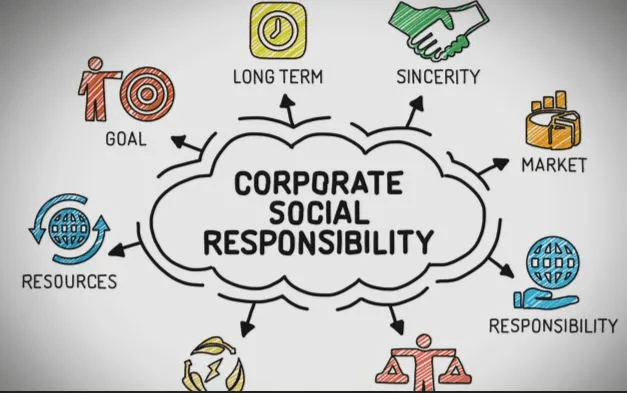Concept of corporate social responsibility (CSR)

When businesses take steps to benefit society and the environment beyond just turning a profit, this is known as corporate social responsibility, or CSR. It indicates that companies behave ethically by being truthful with consumers, lowering pollution, helping out local communities, and treating staff well. Using eco-friendly materials, making charitable contributions, and maintaining safe working conditions are all examples of corporate social responsibility (CSR). The objective is for businesses to continue to expand and prosper while also having a positive impact on the globe. It involves operating a business with consideration, kindness, and fairness in order to benefit not only themselves but also the environment and those in their immediate vicinity.
Table of Contents
Basic elements of corporate social responsibility

The main parts of corporate social responsibility for a company include:
- Doing the Right Thing: Acting honestly, treating everyone fairly, and making ethical choices in business.
- Caring for the Environment: Taking actions to reduce pollution, waste, and using resources wisely to protect the planet.
- Helping the Community: Giving back by supporting local causes, donating, or creating jobs that improve people’s lives.
- Treating Employees Well: Ensuring a safe workplace, offering fair pay, and respecting workers’ rights.
- Being Transparent: Being open and clear about the company’s actions, goals, and decisions with customers and others.
These actions help businesses build trust and contribute to a better world while succeeding in their work.
Benefits of CSR to Business and Society
For Business :
Better Reputation: Companies that practice corporate social responsibility are seen as responsible and trustworthy, making people more likely to support them.
More Sales: Today, many consumers prefer to buy from companies that care about social and environmental issues, which can lead to higher sales.
Happier Employees: Companies that treat their workers well, with fair pay and safe working conditions, create a positive work environment. This leads to happier, more loyal employees.
Lower Costs: By using resources more efficiently, reducing waste, and adopting green practices, companies can save money in the long run.
For Society:
Improved Quality of Life: corporate social responsibility efforts, like charity donations or supporting education, can help improve the lives of people in the community.
Cleaner Environment: Many companies now focus on reducing pollution, conserving water, and using eco-friendly materials to help protect the planet.
Stronger Communities: Through job creation and supporting local causes, businesses can make their communities more vibrant and healthy.
Historical Evolution of CSR
Over time, corporate social responsibility has evolved significantly. Businesses in the early 1900s were primarily concerned with turning a profit. Nonetheless, some businesses began to recognize their social obligations, such as fostering charitable endeavors or offering safe working conditions.
Businesses started to formally implement CSR initiatives in the 1950s. Businesses began to consider their social responsibility, including how they treated their employees and the impact of their actions on the community.
The importance of CSR increased throughout the 1980s and 1990s. Businesses started paying attention to environmentally friendly activities and their effects on the environment. CSR was increasingly incorporated into corporate agendas.
CSR became even more crucial for many businesses in the 2000s. Companies were supposed to operate sustainably, ethically, and transparently.
Drivers of CSR
Public Pressure: People now anticipate that businesses will behave appropriately. Social media has pushed companies to be more responsible by making it simpler for customers to expose unethical practices.
Government Laws: A lot of governments now have laws requiring companies to be more responsible, such as lowering pollution or making sure workers are paid fairly.
Reputation: Businesses aim to project a positive image, and CSR fosters consumer trust, which may boost revenue and improve a brand.
Globalization: As companies grow globally, they must adapt to the demands of various markets and cultural norms. In a global marketplace, CSR helps them maintain their respect and competitiveness.
Profit: A lot of companies are aware that CSR increases revenue. Businesses may save money and draw in more clients by cutting back on trash, using less energy, and providing eco-friendly products.
Theories of CSR
Shareholder Value Theory
According to the shareholder value theory, a company’s primary goal should be to maximize profits for its owners, or shareholders. The premise is that everyone, including clients and staff, gains when the company turns a profit. However, social and environmental issues are not given significant attention in this approach.
Stakeholder Theory
In contrast to the shareholder theory, this theory states that a business should take into account the requirements of all parties impacted by its decisions. Customers, suppliers, workers, local communities, and even the environment are all included in this. Businesses should strive to strike a balance between the welfare of each of these categories and profitability.
According to this notion, long-term success comes from taking care of all parties involved in the business, not just shareholders.
In summary, CSR is about businesses being responsible and caring for people, the environment, and society. It benefits businesses by improving their reputation, saving money, and increasing sales. It also helps society by improving lives and protecting the planet. CSR has evolved over time, and today it’s essential for businesses that want to be seen as ethical and sustainable.
Frequently Asked Questions (FAQ)
What is CSR (Corporate Social Responsibility)?
CSR is when businesses take responsibility for the impact they have on society and the environment, beyond just making profits. This can include actions like treating employees fairly, reducing environmental harm, supporting local communities, and being honest with customers.
Why is CSR important for businesses?
CSR is important because it helps businesses build trust, improve their reputation, and attract customers and investors. Companies that practice CSR can also reduce costs, improve employee satisfaction, and make a positive impact on society and the environment.
How does CSR benefit society?
CSR helps society by addressing social and environmental issues. It can improve the quality of life for people in local communities, support environmental sustainability, and create jobs. CSR also encourages businesses to act ethically and responsibly, benefiting everyone involved.
Related Articles

